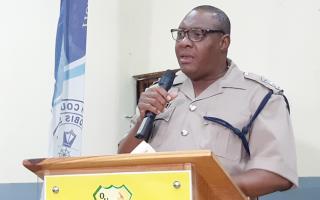Diaspora cannot solve Jamaica’s crime problem

While researching the content for this article, a friend sent me the link to an article by Ambassador Curtis Ward three years ago. The Ambassador's article was themed around a response from Deputy Prime Minister Horace Chang on Diaspora assisting with crime-fighting in Jamaica. The article stated that Minister of National Security Horace Chang "rejected any notion of Jamaican diaspora law enforcement expertise helping Jamaica." I was on that call and was surprised by the minister's response. However, in the far corner of my mind, I understood what he was saying as different from the words he used.
I gleaned from that minister's statement, which could have been crafted differently, that we, as Diasporans, can only help an organization like the JCF and successfully deliver content if we have the appropriate experience, background and skills necessary to improve the organization. Though it appears he was demeaning the abilities of members of the Diaspora, I prefer to take the higher road to understand more than his spoken words. I believe he was saying that we should prove that we have the capacity and resources to help.
In the past ten years, I have heard a diverse range of ideas, stories and personal theories about how the Diaspora can play a role in solving crimes in Jamaica. For example, I have often heard the fallacy that “if we collect US$10 per Diasporan, we can resolve Jamaica’s crime problem.” In multiple forums, I have heard Diaspora members offer millions in cash, their military background, teaching experiences, and law enforcement experiences to solve crimes in Jamaica. I understand how simple it can appear for regular, but passionate people to insert themselves into crime reduction in our country. These are admirable offerings, but it is not and, frankly, cannot be easy to reduce crime. As much as these experiences and professions may offer some content to help, crime reduction solutions require specialized skills, and people who understand global, regional, and local applications and issues and how they can effectively use social science research to identifying solutions. The offer of help should come from high-ranking, successful law enforcement leaders: chiefs, superintendents, and commissioners from similar jurisdictions and criminologists. Jamaica's crime problem is multifaceted, complex and different from other jurisdictions; therefore, it requires extraordinarily unique skills, professional experience, and a customized solutions approach. Successful gang prevention and intervention plans from Los Angeles and San Francisco will not necessarily work in Jamaica. Scientifically, research conducted for a successful gang plan for a specific community in America cannot be applied to the Jamaica crime environment. Rather, the crime reduction approach for Jamaica must be customized and based on sound, well-thought-out strategies based on findings from research on specific communities in Jamaica.
Members of the Diaspora cannot stay outside of Jamaica and solve or positively impact Jamaica's crime problems. It doesn't matter what your skills are and how you are applying them to solving, reducing, or mitigating crime in the Diaspora. Your skills may not be applicable in the Jamaican context; it would be like putting a square peg in a round hole. It just doesn't work like that. From a logical standpoint, the likely questions a police leader would ask are: What programs, interventions and/or solutions are being offered? Have they been evaluated? Are the JCF leaders aware of the interventions, evaluation and results? What were the findings? What are the recommendations? How can the recommendations be implemented and who will pay for the required resources? In addition, is the proposed approach supported by the Government of Jamaica?
The current JCF crime plan and execution may need adjustment, but without research, evaluations, recommendations, and an implementation plan, it is hard to confirm. It's not just about the Diaspora having expertise and experience in law enforcement, teaching, and the military and wishing to give back.
Crime reduction strategies require extensive funding and dedication of resources to solutions. Some of the possible approaches include citizens' relationships with other citizens and with police, and the relationship between police leadership to rank and file officers, detectives, and staff. It also requires up-to-date policies and procedures to hold police officers legally moral and accountable and improve legitimacy and transparency. Reducing crime includes applying the technology and equipment necessary to optimize policing and be more fluid in practice. Police officers must have ongoing training to cultivate better relationships, understand and apply crime statistics, and use devices.
The role of police officers involves undertaking a broad array of work, including assigned tasks of pursuing, arresting, charging criminals, and preventing crime. Their work also includes:
- • Dealing with traffic-related offenses and accidents
- • Resolving community conflicts
- • Reducing or preventing social disorder
- • Creating and maintaining community relations
At the same time, a strong police leader must understand Jamaica's unique criminal justice needs and the community's role in solving crime and create the environment to encourage citizens and communities to perform their role. Crime is not just about empowering police or teaching them skills or techniques. Crime reduction should include helping civil society understand their role in obeying the rule of law and having police and the community work together. The unique law enforcement leader must understand the connection between the roles of the Prime Minister, the Ministers of National Security and Justice, courts, the police and corrections, the law, and civil society in preventing, intervening, and reducing high crime.
If Diaspora members wish to play a role, they can work with communities to learn nonviolent strategies, resolve conflict through effective communication and emotional regulation skills, mentor youth, support community centers, and help prevent or reduce substance abuse. It is essential to engage the police department in delivering community intervention to help improve legitimacy and build community-police relationships.
Diaspora organizations can also seek funding to support research and evaluation to determine the effectiveness of a specific program inside the JCF and/or community, to determine why a program may or may not be working, to test a theory, to produce generalizable knowledge or to contribute to the criminal justice knowledge base. These are long term strategies that cannot be implemented overnight – they require sustained effort. Research and evaluation take time but are essential to making a difference in public safety, where structured, proactive, tightly focused responses can reduce the incidence of a wide range of offenses. Another area of support for specific Diaspora organizations and experts is practical guidance for police leaders responsible for tactical patrol and a review of different evaluation methods used to make recommendations to the JCF.
No single approach will solve or reduce crime. One thing is sure: a ‘willy nilly’, off-the-cuff or topical approach will not and cannot positively impact high crime in Jamaica. As members of the Diaspora with expertise, we should organize ourselves, secure the appropriate funding and be ready to support in the ways that make sense, including conducting research and evaluation, applying appropriate theories and methods, and improving processes and programs. It is time to put those with the requisite skills, expertise, and time to good use.
Leo Gilling is a Diaspora Strategist & Engagement Advocate; and Chairman, Jamaica Diaspora Taskforce Action Network (JDTAN). Send feedback to leogilling@gmail.com.
Old Harbour News is a community-based online news media outlet based in Jamaica with more than 300,000 unique visitors since 2013. However, we are soliciting your support to continue provide independent journalism and unique stories tailored just for you. Your contribution, however small it may be, will ensure our service to you remain independent and grow to serve you better. Click the DONATE BUTTON now to support Old Harbour News. Thank you.



























